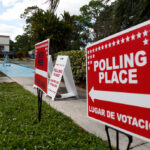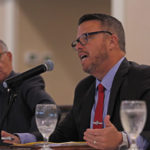INDIAN RIVER COUNTY – Did County Commission District 2 candidate Charlie Wilson forge signatures on petitions he filed to qualify for his run at the seat? It’s a question the Florida Department of Law Enforcement is now investigating.
In the meantime, Supervisor of Elections Kay Clem is defending her decision to file a complaint with FDLE and pull nearly 400 submitted petitions — many because the signatures don’t match with voter records and because the birth dates are wrong. On Monday, Clem copied 20 petitions in question and showed them to reporters as candidate Wilson sat and watched, asking them if any of those shown signatures looked like he penned them.
“I’m not on trial here,” Clem said in response to a question from Wilson about pulling the petitions. “It’s whether you committed fraud” – not whether the signatures match.
“They all start looking alike,” Clem said, paging through the petitions – “same pen, same slant.”
She later added that it is up to FDLE’s officials to determine if the signatures were penned by the same person and if that person were Wilson, adding that neither she nor her staff are handwriting experts.
“It looks like Charlie’s signature to me,” Clem said of one petition in particular that she pointed out.
“Not even close,” Wilson responded, later adding, “None of them could be signed by my hand.”
For about an hour, Wilson and Clem traded barbs and accusations across a table at the Supervisor of Elections building.
Wilson said that he had no idea that there were questionable petitions in the bundles he delivered to Clem’s office because he didn’t review them.
“We pay you to check them,” he told Clem, who chastised him for not looking at the petitions before submitting them for verification.
Clem said that the candidates are responsible for the petitions turned in and added that they should have been checked before making their way to the Supervisor of Elections office.
“Isn’t that convenient?” Clem rhetorically asked after Wilson left, that he did not review the petitions before submitting them. Then, he could claim no knowledge of fraudulent petitions.
“This is like a test period,” she said, for the candidates – to see if they can follow the rules and the laws. If elected, the candidates would be responsible for making rules and laws.
Before the sit down with Clem, Wilson said the first two batches of petitions he submitted – approximately 1,000 of them – he did not review because aside from checking that the forms were signed, there wouldn’t have been much use to do so.
“I wouldn’t have thought about it,” he said of signatures being forged.
Besides which, Wilson said, he would not have had anything to compare the signatures to, that Clem is the one with the voter signatures.
He also said he would not have been able to see that the various signatures were similar in nature, noting he has always had trouble with the game “Memory” or “Concentration.”
Clem said her employee in charge of reviewing the petition signatures has 20 years of experience and trusts in her ability to discern similar writing.
“They are top notch,” Clem said of her staff.
Clem said that FDLE is continuing its investigation and, as such, she would be refraining from further comment on the matter.
“I’m sitting and waiting,” she said for the investigation to conclude.






